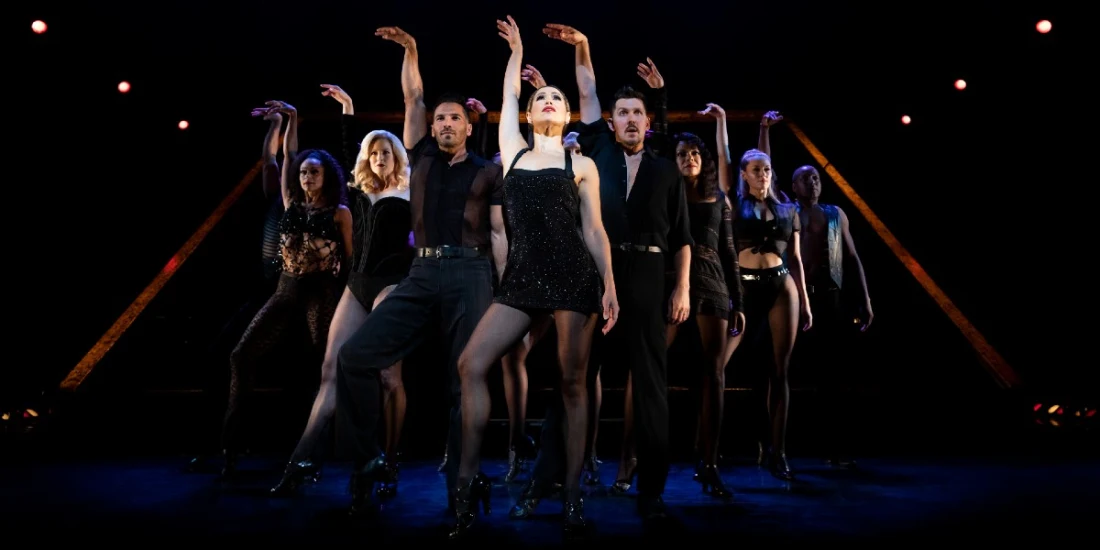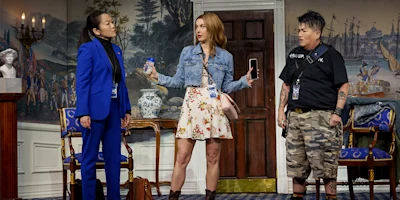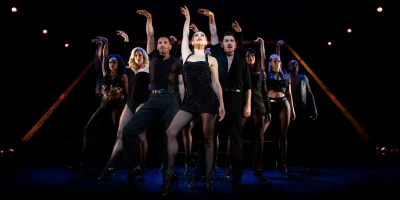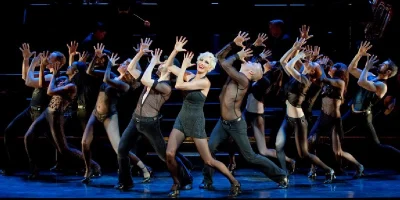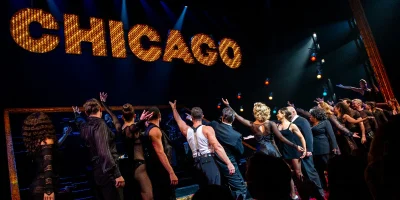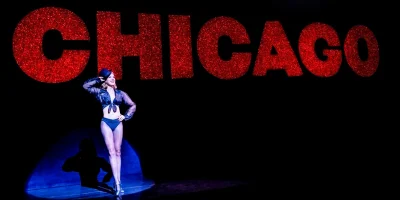
All the songs in 'Chicago' on Broadway
Learn fun facts about the tunes that have brought all that jazz to New York for more than 25 years.
Chicago the musical doesn’t razzle-dazzle audiences with falling chandeliers, flying helicopters, or spinning turntables. The show does so with its score.
In the current Broadway production, which has run since 1996, the orchestra literally takes center stage. That’s because the show’s hot, jazzy music is the real star. The secret to this musical’s record-breaking success — with over 10,000 performances, Chicago is the longest running American show on Broadway (and second longest running overall, behind the British Phantom of the Opera) — lies largely in the music by John Kander and Fred Ebb. The bold, seductive score conveys a fatal flaw in human nature: how easily we allow spectacle to deceive us.
Chicago is also notable for its use of diegetic music. Both the Broadway musical and 2002 film adaptation frame most of the musical numbers as vaudeville or nightclub acts. These songs do not move the story forward in the way of a traditional integrated book musical. Often, Chicago’s songs comment on the action or reveal insights about a character. In numbers like “All that Jazz” and “When You’re Good to Mama,” the dialogue between verses advances the plot, about two murderesses who become overnight celebrities in 1920s Chicago.
Even if you have two left feet, you’re likely to find yourself shimmying and shaking along with the music, if not breaking out into full-on Fosse-style jazz hands. Learn more about all the songs in Chicago on Broadway, including multiple numbers you won’t see on screen.
Get Chicago tickets now.

“All that Jazz”
Nightclub singer Velma Kelly transports us to a “whoopee spot where the gin is cold but the piano's hot.” Among the patrons at Velma’s club are aspiring singer Roxie Hart and her lover Fred Casely. When Fred tries to leave her later that night, Roxie shoots and kills him: “Nobody walks out on me!” By the end of the song, Velma has also been arrested on murder charges.
“Funny Honey”
Roxie convinces her husband, Amos, to take the blame for Fred’s murder by pretending he shot an intruder out of self-defense. However, Amos refuses to play along when he learns the dead man was Roxie’s lover. Her song of “love and devotion” to Amos turns sour: “That scummy, crummy, dummy hubby of mine!”
“Cell Block Tango”
“Pop. Six. Squish. Uh-uh. Cicero. Lipschitz.” In lyrics as unremorseful as they are onomatopoeic, the Six Merry Murderesses of Murderer’s Row at Chicago’s Cook County Jail explain why they killed their partners. Most of the women, Velma included, present themselves as victims of irritating, deceitful, and unfaithful men: “If you’d have been there, if you’d have seen it, I betcha you would’ve done the same.” Only one prisoner, a Hungarian immigrant, insists she is not guilty.

“When You’re Good to Mama”
Mama Morton, the jail’s matron, operates according to a system of “reciprocity.” As she puts it, “When you’re good to Mama, Mama’s good to you.” For the right price, Mama will do all kinds of favors for her inmates, even connecting them with Billy Flynn, the best defense lawyer in town.
Kander and Ebb revealed in their book Colored Lights: Forty Years of Words and Music, Show Biz, Collaboration, and All That Jazz that Matron “Mama Morton” is based on vaudeville star Sophie Tucker – her nickname was “The Last of the Red-Hot Mamas.” (Roxie later name-drops Tucker in the song “Roxie.”)
“All I Care About”
Thanks to Mama Morton, Roxie engages the services of slick, “silver-tongued” defense attorney Billy Flynn. While Billy, backed by a chorus of showgirls, claims he only cares about love, he actually cares very much about getting his full fee of $5,000.
He reveals he is highly skilled at manipulation, especially of the justice system — “twistin' the wrist that's turnin' the screw.” When Roxie can’t come up with all the money, Billy auctions off her belongings to obtain the remaining sum.

“A Little Bit of Good”
Mary Sunshine, a journalist covering Roxie’s trial, believes there is good in even the worst of criminals. “Under every mean veneer, there’s someone warm and dear.”
Billy refers to Mary as a “sob sister,” a derogatory term for female journalists who wrote sentimental human-interest stories. Several so-called “sob sisters” covered murder trials in 1920s Chicago, overtly sympathizing with defendants like the women who inspired Roxie and Velma’s characters.
“We Both Reached for the Gun”
At a press conference for Roxie, Billy depicts his client as a naïve orphan girl seduced by “jazz and liquor” who shot Fred Casely in an act of self-defense. “He had strength and she had none, and yet they both reached for the gun!” Roxie poses as a dummy, controlled by ventriloquist Billy Flynn. Fittingly, this song is also called “The Press Conference Rag.”

“Roxie”
Foxy Roxie Hart has eclipsed Velma as the most infamous and desirable murderess in town, and she delights in her newfound celebrity. She plans to leverage her fame into a vaudeville act, which Roxie imagines in great detail, down to her bling and her backup singers. “Who says that murder’s not an art?”
“I Can’t Do It Alone”
In “an act of desperation,” Velma tries to convince Roxie to join her on tour once they are both acquitted. Velma goes through her former routine, which she used to perform with her sister Veronica. She shows off dance steps, corny jokes (“What state’s Chicago in? Illinois!”), and more to show Roxie how great the act is. Roxie is not impressed.
“I Can’t Do It Alone (Reprise)”
When a woman dubbed “Go to Hell Kitty” commits a scandalous murder, both Roxie and Velma suddenly become yesterday’s news. Velma sings a brief reprise of “I Can’t Do It Alone” in which she compares herself to a jilted bride, emphasizing how completely abandoned she feels.
“My Own Best Friend”
This song, which is not in the movie, highlights the Roxie and Velma’s similarities – their determination, their ego, and their philosophy that they can only count on themselves: “I am my own best friend.” Although Roxie and Velma technically sing this duet together, they are not singing to each other. As Act I draws to a close, Roxie pretends to be pregnant.

“I Know a Girl”
An incredulous Velma expresses her envy and frustration at Roxie’s luck. Roxie manages to keep taking back the spotlight, this time with the lie about her supposed pregnancy. “What that mouse is selling, that whole world buys and nobody smells a rat.” This song was cut from the movie.
“Me and My Baby”
Roxie whips up the media circus by waxing poetic about her “dear little” pretend baby. She earns sympathy from Mary Sunshine, who pressures Billy to give Roxie an earlier trial date on account of the baby. Amos is thrilled, erroneously believing he is the father.
Like the two previous songs, “Me and My Baby” is exclusive to the Chicago Broadway show.
“Mr. Cellophane”
Amos laments that everyone ignores him, including Roxie, even though he is the father of her baby. “You can look right through me, walk right by me, and never know I'm there,” he sings. But Billy points out why Amos couldn’t possibly be the father, and Amos plays right into Billy’s hands, deciding to divorce his wife.

“When Velma Takes the Stand”
In an attempt to get Billy to focus on her case instead of Roxie’s, Velma shows her lawyer what she plans to do on the witness stand. The melodramatic routine includes asking for a glass of water, crying, and pretending to faint. Billy appears unenthused, though he later has Roxie enact some of Velma’s ideas at her trial instead.
This song is not in the Chicago movie.
“Razzle Dazzle”
Billy shines in this ode to showmanship. He assures Roxie she has nothing to fear at her impending trial because he has spun a masterful defense, which will move and impress the jury like they were a theatre audience. “How can they hear the truth above the roar?” They can’t, and that’s the point. It’s all showbiz, and he is a star. He promises this trial will acquit Roxie and make her a star too.
“Class”
Mama and Velma are listening to Roxie’s trial on the radio. Velma is disgusted by the histrionic proceedings and angry that Roxie stole her trial ideas. In a fantastic example of irony, the murderess and the matron decry the fact that “nobody’s got no class” anymore.
This song was cut from the movie, though a version is included on the soundtrack.

“Nowadays”
Roxie is devastated to realize the news cycle has moved on now that she’s been acquitted. But all is not lost; she tours in a double act with Velma, who has also been acquitted. Their act celebrates the freedoms of the Jazz Age: “Oh, it’s heaven nowadays!”
Additional Chicago music
The score also includes several musical and dance numbers that are primarily instrumental, including the overture, “Chicago After Midnight,” the Act I finale, the entr’acte, and “Finale.” These musical numbers occasionally underscore dialogue or an announcement from the show’s emcee, but they do not include lyrics.
Get Chicago tickets now.
Photo credit: Chicago on Broadway. (Photos by Jeremy Daniel)
Frequently asked questions
What is Chicago about?
See why this second-longest-running Broadway show has razzle-dazzled so many audiences. A scorching satire of celebrity culture with classic Kander and Ebb tunes, Chicago shows how two ladies use showbiz pizzazz to get away with murder. Get tickets to witness the criminally fun revival that won six Tony Awards.
Where is Chicago playing?
Chicago is playing at Ambassador Theatre. The theatre is located at 219 West 49th Street, New York, 10019.
How long is Chicago?
The running time of Chicago is 2hr 30min. Incl. 15min intermission.
What's the age requirement for Chicago?
The recommended age for Chicago is Ages 13+. Children under 4 are not permitted..
How do you book tickets for Chicago?
Book tickets for Chicago on New York Theatre Guide.
Who wrote the Chicago musical?
The music for Chicago is written by composer John Kander and lyricist Fred Ebb. Ebb also co-wrote the show's script with Bob Fosse. They adapted the musical from a 1926 play by Maurine Dallas Watkins, also titled Chicago.
What songs are in Chicago on Broadway?
The songs for Chicago, written by John Kander and Fred Ebb, include "Cell Block Tango," "All That Jazz," "Razzle Dazzle," "Roxie," and "We Both Reached for the Gun." Learn about all the songs in Chicago on Broadway.
Is Chicago on Broadway appropriate for kids?
Chicago is not recommended for young children; the age recommendation is 13 and up due to its themes of murder, sex, crime, and adultery. Please note that children 4 and younger are not permitted in Broadway theatres.
When did Chicago open on Broadway?
The current production of Chicago opened in 1996. It was the musical's first revival following its 1996 premiere. Chicago is now the second-longest-running show and longest-running revival in Broadway history.
Who directed Chicago on Broadway?
Walter Bobbie directs the current production of the Chicago musical. He has worked on Broadway as a writer, director, and performer since 1971, and he's also known for staging musicals like Sweet Charity, Footloose, and Bright Star.
Is Chicago on Broadway good?
New York Theatre Guide's 20th-anniversary review of Chicago calls the show "a living, breathing piece of musical theatre history, which rightfully remains at the Ambassador Theatre and reminds us that all you need is class and, of course, all that jazz," rating it five stars. Chicago is now more than 25 years old, proving the lasting appeal of its story, songs, and talent.
Originally published on
